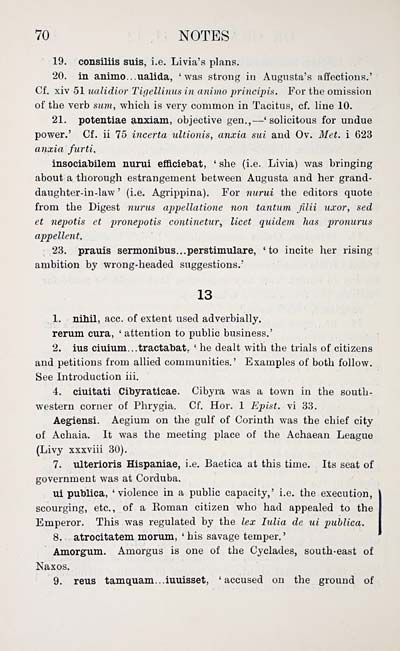Download files
Complete book:
Individual page:
Thumbnail gallery: Grid view | List view

70 NOTES
19. consiliis suis, i.e. Livia's plans.
20. in animo . . . ualida, 'was strong in Augusta's affections.'
Cf. xiv 51 ualidior TigelUnus in animo principis. For the omission
of the verb sum, which is very common in Tacitus, cf. line 10.
21. potentiae anxiam, objective gen., — 'solicitous for undue
power.' Cf. ii 75 incerta ultionis, anxia sui and Ov. Met. i 623
anxia furti.
insociabilem nurui efficiebat, ' she (i.e. Livia) was bringing
about a thorough estrangement between Augusta and her grand-
daughter-in-law ' (i.e. Agrippina). For nurui the editors quote
from the Digest nurus appellatione non tantum filii uxor, sed
et nepotis ct pronepotis continetur, licet quidem has pronurus
appellent.
23. prauis sermonibus...perstimulare, 'to incite her rising
ambition by wrong-headed suggestions.'
13
1. nibil, ace. of extent used adverbially.
rerum cura, ' attention to public business.'
2. ius ciuium...tractabat, ' he dealt with the trials of citizens
and petitions from allied communities.' Examples of both follow.
See Introduction iii.
4. ciuitati Cibyraticae. Cibyra was a town in the south-
western corner of Phrygia. Cf. Hor. 1 Epist. vi 33.
Aegiensi. Aegium on the gulf of Corinth was the chief city
of Achaia. It was the meeting place of the Achaean League
(Livy xxxviii 30).
7. ulterioris Hispaniae, i.e. Baetica at this time. Its seat of
government was at Corduba.
ui publica, 'violence in a public capacity,' i.e. the execution,
scourging, etc., of a Eoman citizen who had appealed to the
Emperor. This was regulated by the lex lulia de ui publica.
8. atrocitatem moruin, 'his savage temper.'
Amorgrum. Amorgus is one of the Cyclades, south-east of
Naxos.
9. reus tamquam...iuuisset, 'accused on the ground of
19. consiliis suis, i.e. Livia's plans.
20. in animo . . . ualida, 'was strong in Augusta's affections.'
Cf. xiv 51 ualidior TigelUnus in animo principis. For the omission
of the verb sum, which is very common in Tacitus, cf. line 10.
21. potentiae anxiam, objective gen., — 'solicitous for undue
power.' Cf. ii 75 incerta ultionis, anxia sui and Ov. Met. i 623
anxia furti.
insociabilem nurui efficiebat, ' she (i.e. Livia) was bringing
about a thorough estrangement between Augusta and her grand-
daughter-in-law ' (i.e. Agrippina). For nurui the editors quote
from the Digest nurus appellatione non tantum filii uxor, sed
et nepotis ct pronepotis continetur, licet quidem has pronurus
appellent.
23. prauis sermonibus...perstimulare, 'to incite her rising
ambition by wrong-headed suggestions.'
13
1. nibil, ace. of extent used adverbially.
rerum cura, ' attention to public business.'
2. ius ciuium...tractabat, ' he dealt with the trials of citizens
and petitions from allied communities.' Examples of both follow.
See Introduction iii.
4. ciuitati Cibyraticae. Cibyra was a town in the south-
western corner of Phrygia. Cf. Hor. 1 Epist. vi 33.
Aegiensi. Aegium on the gulf of Corinth was the chief city
of Achaia. It was the meeting place of the Achaean League
(Livy xxxviii 30).
7. ulterioris Hispaniae, i.e. Baetica at this time. Its seat of
government was at Corduba.
ui publica, 'violence in a public capacity,' i.e. the execution,
scourging, etc., of a Eoman citizen who had appealed to the
Emperor. This was regulated by the lex lulia de ui publica.
8. atrocitatem moruin, 'his savage temper.'
Amorgrum. Amorgus is one of the Cyclades, south-east of
Naxos.
9. reus tamquam...iuuisset, 'accused on the ground of
Set display mode to: Large image | Transcription
Images and transcriptions on this page, including medium image downloads, may be used under the Creative Commons Attribution 4.0 International Licence unless otherwise stated. ![]()
| Early Gaelic Book Collections > Matheson Collection > Annals of Tacitus, Book IV > (102) |
|---|
| Permanent URL | https://digital.nls.uk/76545025 |
|---|
| Description | Items from a collection of 170 volumes relating to Gaelic matters. Mainly philological works in the Celtic and some non-Celtic languages. Some books extensively annotated by Angus Matheson, the first Professor of Celtic at Glasgow University. |
|---|
| Description | Selected items from five 'Special and Named Printed Collections'. Includes books in Gaelic and other Celtic languages, works about the Gaels, their languages, literature, culture and history. |
|---|

